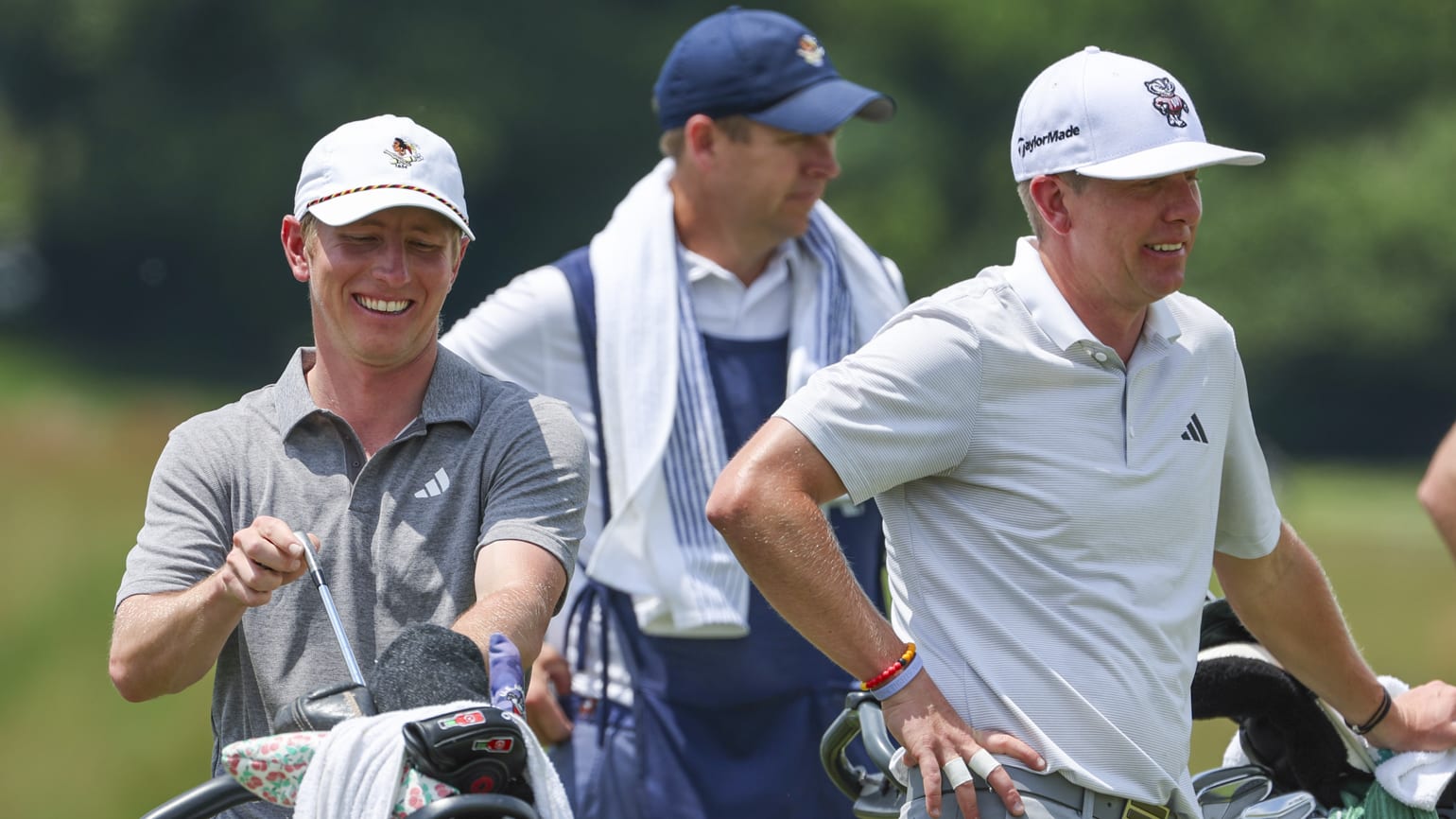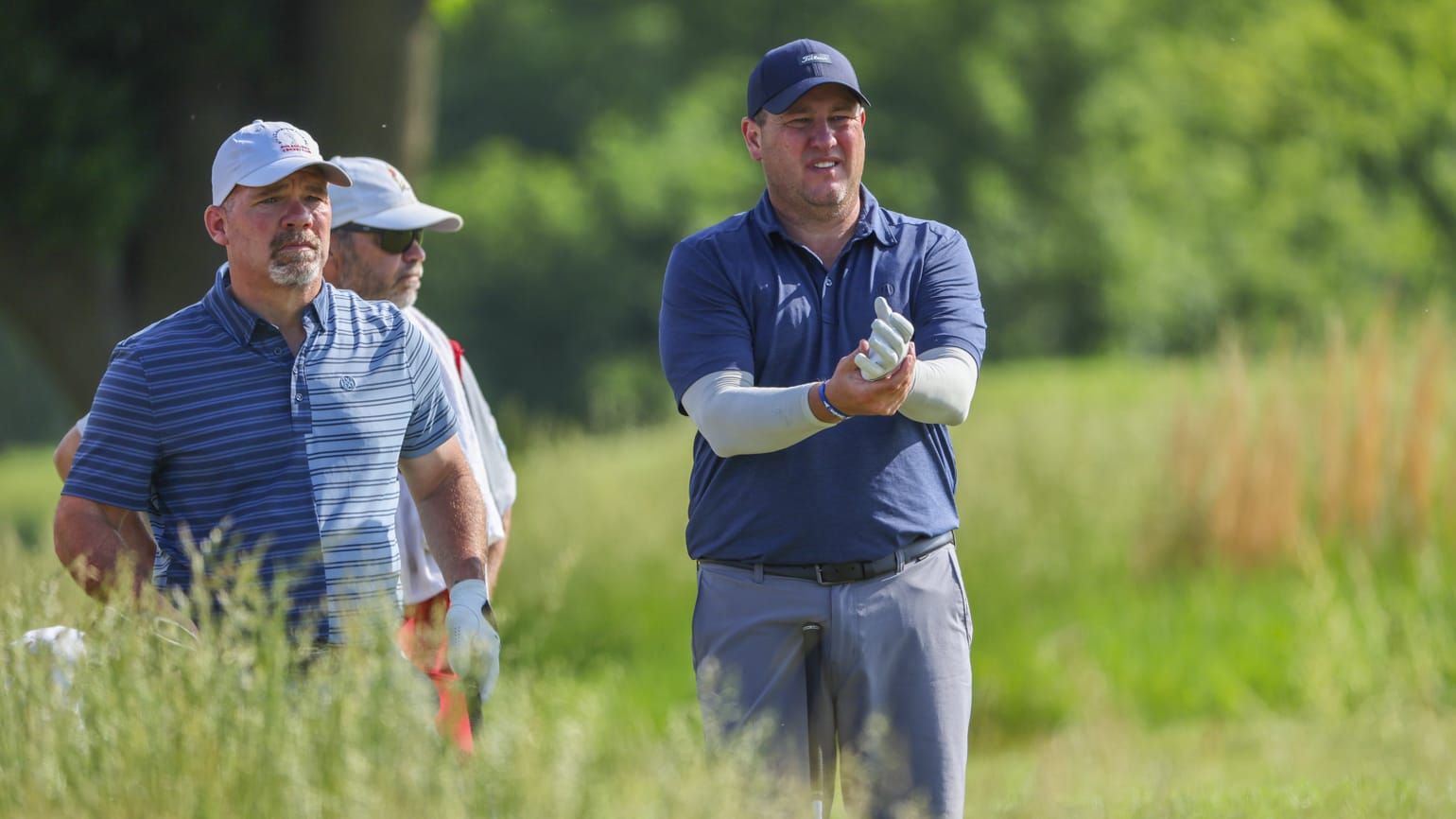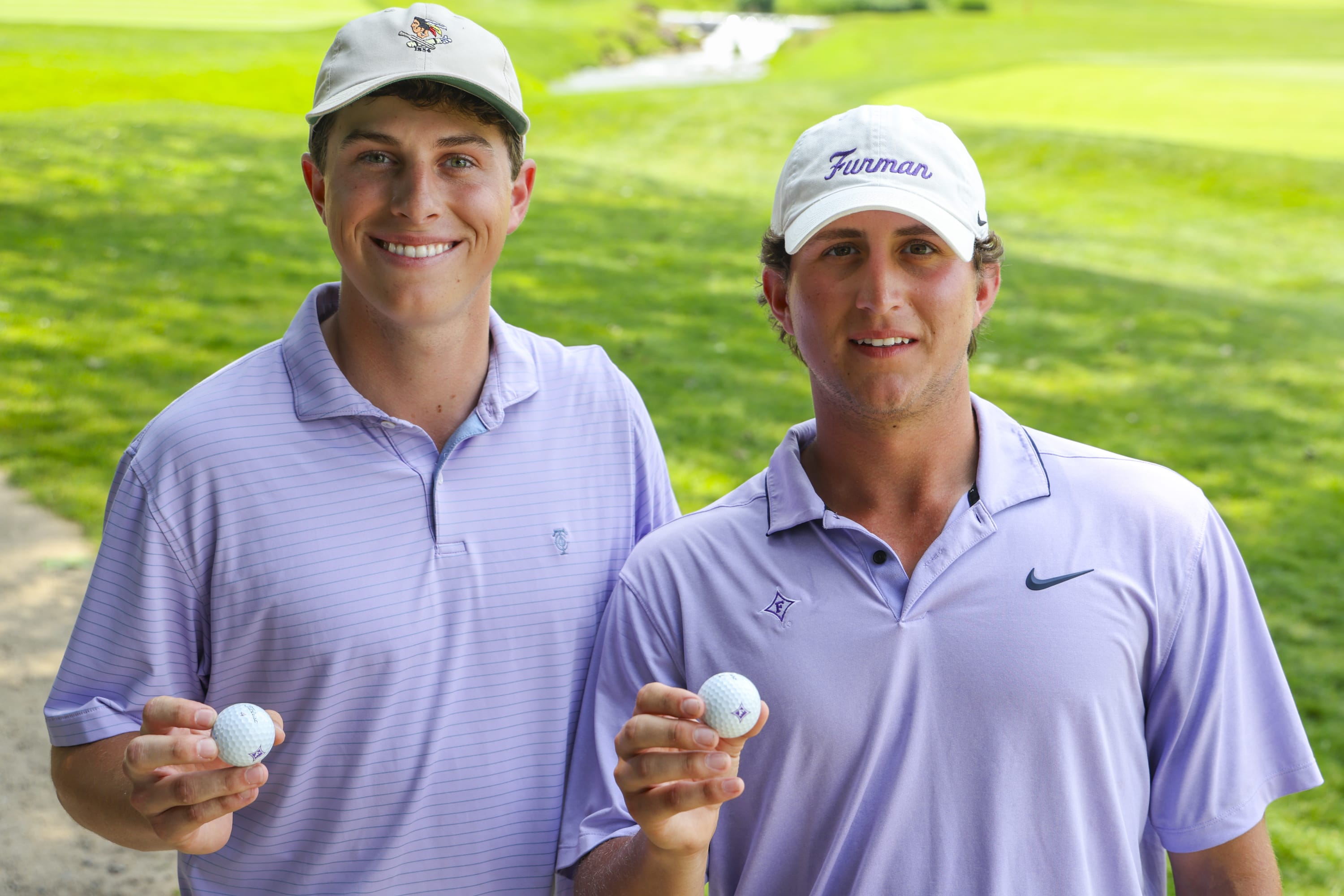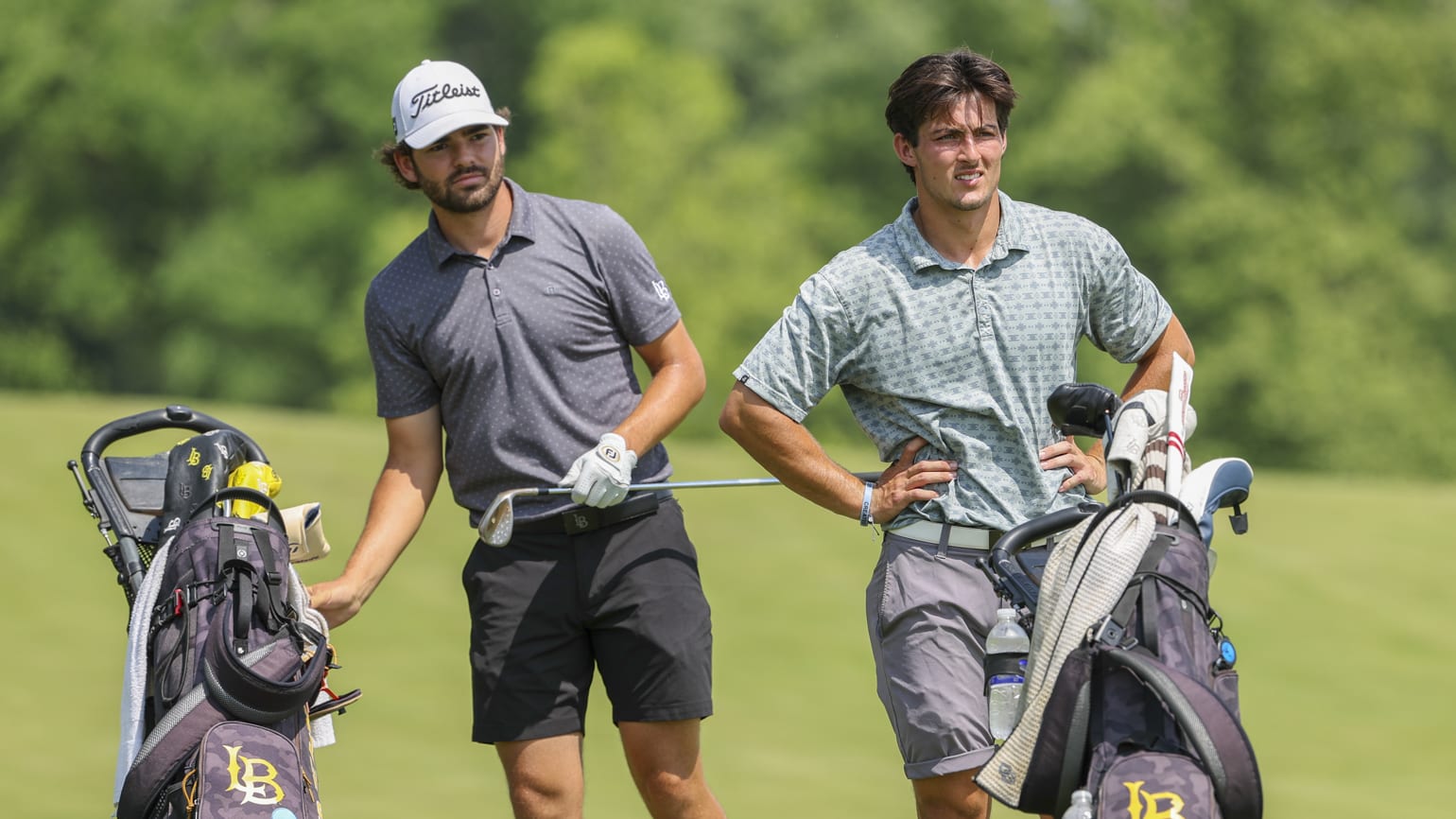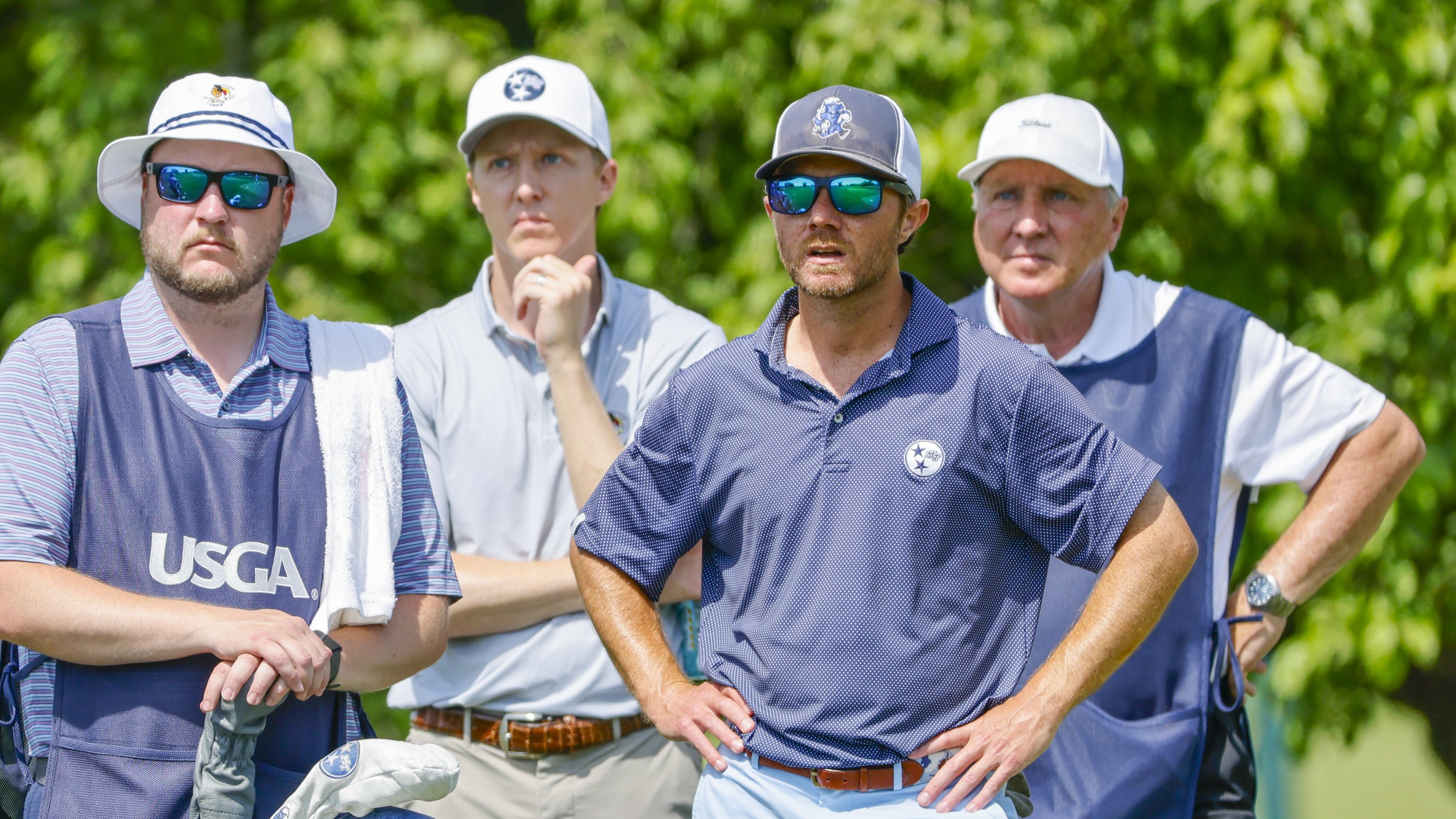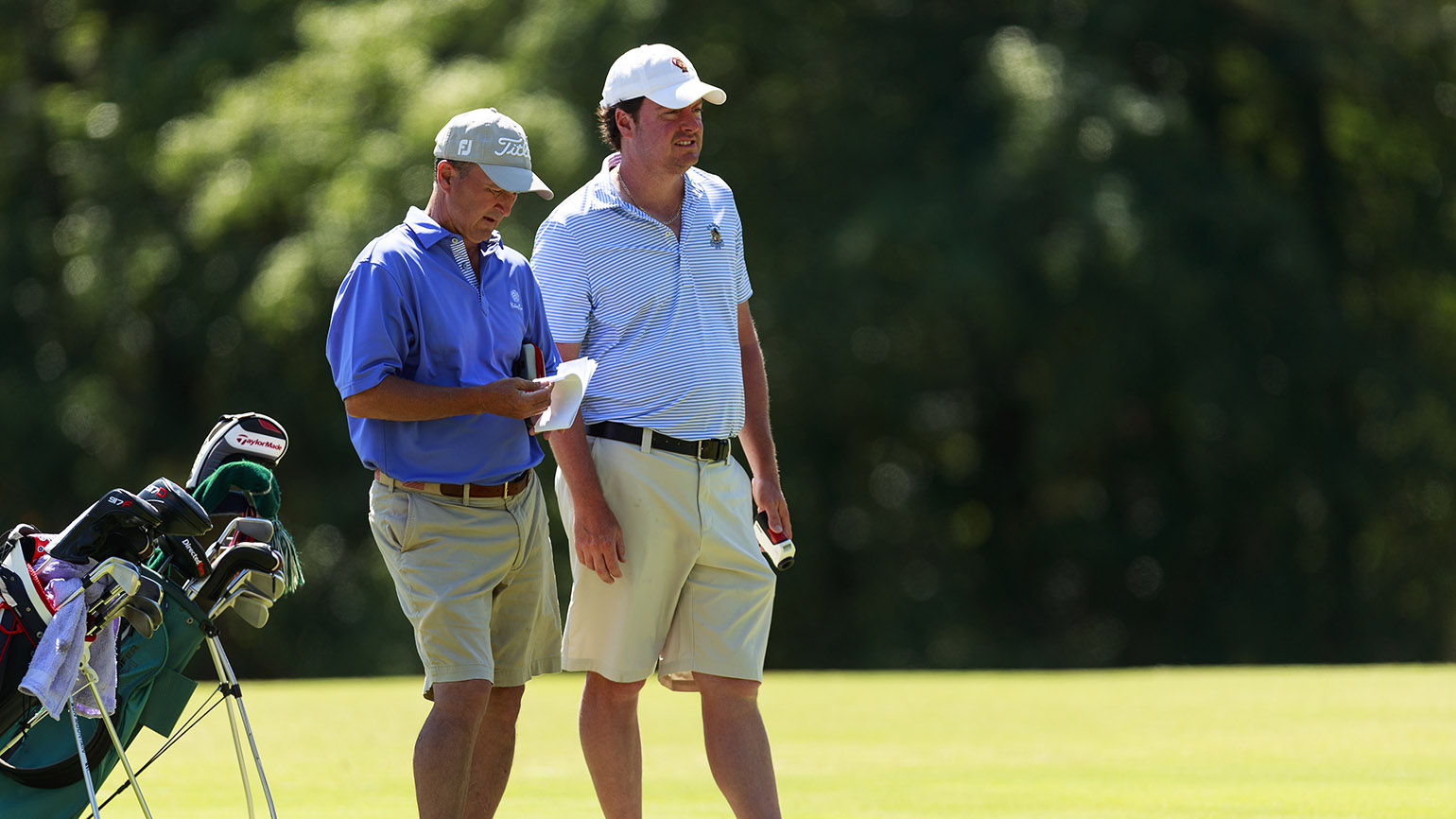Foushee, Ziegler Record-Tying Medalists (126) at Philly Cricket Club
What Happened
Oregonians Zach Foushee and Robbie Ziegler continued their torrid play on Sunday at the 9th U.S. Amateur Four-Ball Championship at Philadelphia Cricket Club, backing up their first-round 62 with a 6-under 64 to tie the 36-hole scoring record en route to earning medalist honors.
Their two-round total of 16-under 126 matched the totals shot in 2016 by Brandon Matthews and Patrick Ross at Winged Foot Golf Club, and year ago at Kiawah Island Club both by teenagers Carter Loflin and Wells Williams as well as eventual champions Aaron Du and Sampson Zheng.
The two ex-University of Oregon standouts and longtime friends began the championship on the 7,204-yard, par-72 Militia Hill Course, the stroke-play co-host venue, before moving over to the 7,013-yard, par-70 Wissahickon Course, a classic A.W. Tillinghast design that opened in 1922.
Foushee, 29, of Lake Oswego, and Ziegler, 33, of Tualitan, finished two strokes better than first-round co-leaders and Indiana residents Kenny Cook, 44, of Noblesville, and Sean Rowen, 50, of Greenwood, and ex-Middle Tennessee State teammates Payne Denman, 32, of Murfreesboro, Tenn., and Brett Patterson, 32, of Oxford, Miss.
Cook, the 2011 U.S. Mid-Amateur runner-up, and Rowen backed up their 62 with a 66 on Wissahickon, while Denman, the assistant men’s golf coach at Middle Tennessee State, and Patterson, a full-time accounting professor at the University of Mississippi who reached the 2023 U.S. Mid-Amateur semifinals, shook off a slow start to post a 66 on Militia Hill after a 62 on Saturday.
Jack Cantlay, 20, of Los Alamitos, Calif., the younger brother of eight-time PGA Tour winner Patrick Cantlay, and his Long Beach State teammate, Jaden Huggins, 20, of Murrieta, Calif., posted a 63 at Wissahickon to finish at 13-under 129.
The cut for match play came at 7-under 135 with 11 sides playing off on Monday morning at Wissahickon for the final six spots in the 32-team draw.
For a second consecutive day, the competitors were greeted with chamber-of-commerce weather and idyllic scoring conditions, with virtually no wind and temperatures in the 80s.
Foushee (pronounced FOO-SHAY), a real estate agent who was on Oregon’s 2016 NCAA title team, and Ziegler, a marketing representative for adidas Golf who oversees NIL deals for college and amateur players, had a chance at the 36-hole scoring mark after consecutive birdies on Nos. 12 and 13, but they registered five consecutive pars coming home.
“We came in just hoping to make match play, honestly,” said Foushee, who briefly played on PGA Tour Canada before regaining his amateur status five years ago. “We played the last couple of weeks out in Oregon, and it wasn’t our best, but we came in, practiced, got a couple of good range sessions in and we both hit the ball really nicely. We gave ourselves two good looks on most of the holes out there, and when we didn’t, the other person picked it up.”
Both Rowen and Cook, competing in their sixth U.S. Amateur Four-Ball, found the greens to be much firmer and more challenging than on Saturday. Of course, they were playing the older, more-established layout that will be the site for the matches going forward.
“It’s demanding,” said Cook of the Wissahickon layout. “You have to hit some really good shots to get it close.”
Cantlay and Huggins are hoping for the same karma that last year’s champions enjoyed: barely miss qualifying for NCAAs as a team and then win the U.S. Amateur Four-Ball a week later.
Du and Zheng saw their University of California squad fall three strokes shy of a berth in 2023. They channeled the disappointment into a USGA title.
Cantlay, Huggins and Long Beach State were even closer, missing by two strokes at the recent NCAA Chapel Hill (N.C.) Regional.
But they came into the championship in postseason form, as their 63 on Sunday illustrated. On the 546-yard, par-5 12th, Cantlay delivered one of the side’s best moments of the weekend, cutting a 3-iron from 245 yards to 15 feet to set up an eagle. Huggins would add a birdie on No. 17.
“[Jack] was saying we haven’t really made an eagle in qualifying or in yesterday’s round,” said Huggins, “and he goes, ‘Let’s just make an eagle.’ And then he goes and makes an eagle. Spoke it into existence.”
Denman and Patterson, who just recently obtained his Ph.D. in accounting at Ole Miss, seemed comfortably inside the cutline as the day began. But as they approached the ninth tee on Sunday, the duo was only even par for the day at Militia Hill and hugging close to the mark. Denman provided some relief by stuffing his tee shot on the 244-yard, par-3 to eight feet to set up a birdie. He would add a 9-footer on No. 10, leading a stretch of 6-under golf over the final 10 holes and nowhere near the cut.
“I think we were kind of dragging a little bit,” said Denman. “We were even par through eight and we both missed like 3-footers on four [after a birdie on 3]. It was a little bit of a wake-up call. We were kind of checking in with each other, making sure we were all right. We had to stay patient. Sure enough, we did.”
The round of the championship belonged to a pair of Furman University teammates, Trey Diehl, 20, of Orlando, Fla., and Mac Scott, 22, of Birmingham, Ala., who finished with three consecutive birdies on Wissahickon to match the 18-hole scoring mark of 61. Their day included a second-nine 29. A 61 had been posted on four other occasions, including last year by the medalists and eventual champions Du/Zheng.
Coupled with the 3-under 69 shot at Militia Hill, the side posted 12-under 130, to share fifth with 29-year-old Coloradoans Jimmy Makloski, of Pueblo, and Colin Prater, of Colorado Springs, and 16-year-old North Carolina rising high school juniors Daniel McBrien, of Holly Springs, and Smith Summerlin, of Raleigh.
Makloski just completed his third season as the assistant men’s golf coach at the United States Air Force Academy, and Prater, a science teacher at Doherty High in Colorado Springs, also coaches golf at the school. Last summer, Prater advanced to match play in the U.S. Amateur at Cherry Hills Country Club en route to earning Colorado Golf Association Player of the Year honors for a second time.
Diehl, a rising junior, and Scott, who just finished his senior season, took advantage of their length, which put a lot of shorter clubs in their hands for approach shots.
“It’s pretty cool,” said Scott of matching the record. “It was a lot of fun. Some putts fell, and yesterday we didn’t play too great, so it was kind of nice to see some putts fall once we got some momentum going. We were just feeding off each other.”
What’s Next
The playoff for the final six spots in the draw will take place at 6:45 a.m. EDT starting at the 11th hole. The Round of 32 is scheduled to commence at 7:30 a.m. The Round of 16 and quarterfinals will be contested on Tuesday, with the semifinals and 18-hole championship match on Wednesday. Admission is free and spectators are encouraged to attend. All parking is at Chestnut Hill College with free shuttle service to Philadelphia Cricket Club.
Notable
- Among the 11 sides in the playoff are 2022 champions Chad Wilfong and Davis Womble; 2018 U.S. Mid-Amateur runner-up Brett Boner and Stephen Woodard, two brother tandems in Joe and Sam Migdal, and Trevor and Trenton Mierl, and 2023 U.S. Senior Amateur competitor Jon Brown and Jon Olson, both from Iowa.
- Inaugural U.S. Amateur Four-Ball champions Nathan Smith and Todd White; two-time runners-up Drew Kittleson and Drew Stoltz; and 2023 U.S. Mid-Amateur runner-up Evan Beck and Dan Walters were among the notables to qualify for match play. Beck and Walters were semifinalists two years ago at the Country Club of Birmingham, not far from Shoal Creek where Beck was the 2008 U.S. Junior Amateur runner-up. Beck also is the highest ranked player in the field, according to the World Amateur Golf Ranking®(WAGR®) at No. 50.
- Another notable “local” side to advance was that of Tug Maude and John Sawin, two players who grew up at nearby Merion Golf Cub. Maude, the 2005 Golf Association of Philadelphia’s Player of the Year, now lives in Atlanta, and Sawin is the director of golf at Pebble Beach (Calif.) Golf Links, site of six U.S. Opens and last year’s U.S. Women’s Open.
- The two youngest sides in the field both advanced: North Carolina 16-year-olds Daniel McBrien and Smith Summerlin, and brothers Brooks (16) and Luke Harper (18), of Dallas, Texas. Summerlin competed in the 2021 U.S. Junior Amateur at The Country Club of North Carolina as a 13-year-old.
- Two past champions failed to qualify for match play: Scott Harvey and Todd Mitchell (2019) and Benjamin Baxter and Andrew Buchanan (2016).
- Also failing to advance were Philadelphia Cricket Club members Andy Latowski and Gregor Orlando, the father/son duo of John and Andrew Sajevic, brothers Tucker and Tanner Wadkins, the sons of World Golf Hall of Famer Lanny Wadkins, and Graham and Jack Boatwright, the grandsons of the late USGA executive director P.J. Boatwright Jr.
- Bryce Haney posted an even-par score (72 at Militia Hill) for a second consecutive day as a solo side. A semifinalist last year with Tyler Goecke, Haney was forced to play alone when Illinois qualified for this week’s NCAAs in Carlsbad, Calif.
- West Streib, who failed to advance to match play with partner and fellow Georgian Chris Blackburn, is the co-general chairman for next year’s U.S. Girls’ Junior Championship at Atlanta Athletic Club. It was Streib who spearheaded the outreach to bring more USGA championships to the 36-hole facility. AAC, which recently hosted a camp for the inaugural U.S. National Junior Team, also will host the 2030 U.S. Amateur and 2035 U.S. Women’s Amateur.
Quotable
“We’re going to get everyone’s best shot being the one seed. So, we’re going to have to keep playing well.” – Robbie Ziegler
“Four-ball is a tricky format. You’ve just got to hit it as close as possible and hopefully make a few more putts than the other guys. It doesn’t matter if you are seeded one or No. 32. Get some momentum going … and kind of ride it.” – Brett Patterson
“My wife is due in July [with our second child]. Super lucky. It’s such a fun week to be out here with Jimmy just playing golf. I had never played golf in the Northeast before. We’re just trying to cherish it and make memories and try to make a lot of birdies.” – Colin Prater on his U.S. Amateur Four-Ball experience with partner and fellow Coloradoan Jimmy Makloski
“We’ve actually been living together for the last year. So, we’ve got some pretty good chemistry. It’s just golf. We do this all the time, so it’s kind of fun to [play] a tournament format where it’s two-man. Not [just] playing for yourself. We’ve played a lot together. [That] makes it easy.” – Mac Scott on partnering with Furman University teammate Trey Diehl
“I think in match play, as long as you’re trying to beat your playing partner all day long, the other team doesn’t really matter. You’ll figure out where everything lands at the end of it.” – Jack Cantlay on the side’s mindset for match play
David Shefter is a senior staff writer for the USGA. Email him at dshefter@usga.org.

